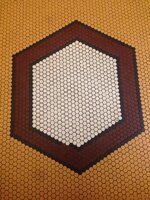Knowledge from Doing
By now, many of you probably feel your rating system is good enough. I felt the same way until this morning when I tried @Steinmetzify's rating system, I found there is much to learn.
In Hebrew, the word Da'at (knowledge) is the knowledge that comes from doing. There is a big difference between reading about light pressure while shaving and bleeding from too much pressure.
This morning, I used the "Steinmetzify Rating System" with some minor modifications and a major one. The major modification was verbalizing the word "previsualize" before each stroke.

Seven reps begin to move knowledge from conscious to unconscious action. It takes about seven times seven to enter the first level of unconscious action. (Consider the numbers a concept, not the scientific numbers).
If you desire, print the checklist and use it for a week with no changes. Modify and repeat for seven weeks.
By now, many of you probably feel your rating system is good enough. I felt the same way until this morning when I tried @Steinmetzify's rating system, I found there is much to learn.
In Hebrew, the word Da'at (knowledge) is the knowledge that comes from doing. There is a big difference between reading about light pressure while shaving and bleeding from too much pressure.
This morning, I used the "Steinmetzify Rating System" with some minor modifications and a major one. The major modification was verbalizing the word "previsualize" before each stroke.
Seven reps begin to move knowledge from conscious to unconscious action. It takes about seven times seven to enter the first level of unconscious action. (Consider the numbers a concept, not the scientific numbers).
If you desire, print the checklist and use it for a week with no changes. Modify and repeat for seven weeks.
Last edited:









